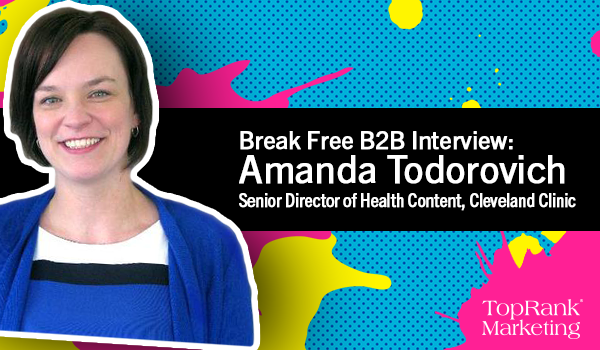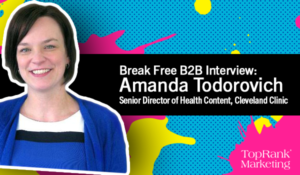
 Amanda Todorovich is the Senior Director of Health Content at Cleveland Clinic. That title kind of undersells what she did over there. She turned a neglected blog into a revenue stream. That's right - something that is generating money and is getting over 7 million visitors a month. Now Amanda is a true believer, like our agency, in the power of audience-centered content. She is living proof that investing in this kind of content pays off. Join us in learning more from Amanda. She is one of the leading lights and is at the vanguard of next-generation content marketers, and we are thrilled to speak with her. View the entire interview below. Below are a few of our favorite snippets from the interview. Sue: Recently on your Twitter channel, you retweeted that Cleveland Clinic has monetized its blog successfully. Can you share details? Amanda: Sure. So we actually started monetizing the site in 2015. We started really small - experimental at that point. We were getting about 3 million visits a month. And we started with a Google pilot, like, let's just slap up some Google ads and see what we get. If we get any kind of negative reaction internally, or we see a drop in traffic, which we didn't basically, we got no reaction because people are so used to seeing ads, I think that they just accepted it. So that was fine. But it's a lot of work. And as a nonprofit, there were a lot of rules around what we couldn't have as advertising on our site, and managing that was a lot of work and for not a very high payoff. So we knew that we could do it, we knew that it wouldn't really affect our traffic much. But, we knew that we needed to think about it a little differently, so we partnered with another publisher very well. They sell and manage all of our inventory. Since then, we've tripled our ad revenue and we definitely have evolved and expanded our monetization efforts outside of just our health center's blog into our constant PT physician blog, as well as our health library content. So it's revenue that comes directly back into our marketing division, and supports a lot of the work that we're doing now. Sue: In terms of SEO, where's your focus in terms of your really big concepts. Amanda: SEO has evolved a lot for us over the years and honestly, I just formally took responsibility for our overall SEO strategy this year. It used to be a whole separate thing. So we were trying to work through that and, you know, it had its challenges. Plus, it wasn't a real big focus for us. Over the years, we've shifted from where 60% to 70% of our traffic was coming from social media. Today 80 to 90% comes from organic search. Our SEO strategy today is extremely data-driven, the way that we prioritize the work and the way that we look at what we're going to focus our time and effort on is really around a couple of things - competitive analysis and content gaps that we have, as well as the difficulty for ranking. Where do we have an opportunity with existing content to potentially climb the ladder a little easier with some tweaking? Now, it's also a little bit more around assembling a comprehensive, integrated team, and not just from an editorial writing perspective, but from a multimedia perspective. What animation, illustration, and video imagery can we bring to that page to make it the best experience on the internet. Sue: You retweeted this from one of your team members, and I love this- "Yes, content campaigns are the devil." So your integrated marketing campaign, it's focused on selling to customers? Amanda: I think it's really important content marketing is not a campaign, it's not a project, it's not a one-off. We like to talk about our content channels and process like products, you know, you really need to invest in them. It's a long-term strategy. It's something that you really have to think about how you build a long-term committed relationship with that user - it's not a one-and-done. There's never really an end to it. It's continuous and iterative. It's imperative that people understand that content marketing isn't a fling, it's not a blip, it's not done and move on to the next. Again, we talk a lot about optimizing existing content, reaching the right people with your content, being hyper-relevant, making it amazing. That's the focus. That's how you have to think about it. Because the start and ends and start and stops and buying for a campaign - all these different people and departments slow you way down, and your audience sees through it. People are savvy and smart. They know when something is meant to sell. You really have to be careful with that. Most kinds of marketing programs are about relationships and trust-building. And every time you take a step or stab at that, it dilutes again, your results and your ability to be successful. Be sure to listen to the full interview above to get all of Amanda Todorvich's insights as we B2B marketers "Break Free".
Amanda Todorovich is the Senior Director of Health Content at Cleveland Clinic. That title kind of undersells what she did over there. She turned a neglected blog into a revenue stream. That's right - something that is generating money and is getting over 7 million visitors a month. Now Amanda is a true believer, like our agency, in the power of audience-centered content. She is living proof that investing in this kind of content pays off. Join us in learning more from Amanda. She is one of the leading lights and is at the vanguard of next-generation content marketers, and we are thrilled to speak with her. View the entire interview below. Below are a few of our favorite snippets from the interview. Sue: Recently on your Twitter channel, you retweeted that Cleveland Clinic has monetized its blog successfully. Can you share details? Amanda: Sure. So we actually started monetizing the site in 2015. We started really small - experimental at that point. We were getting about 3 million visits a month. And we started with a Google pilot, like, let's just slap up some Google ads and see what we get. If we get any kind of negative reaction internally, or we see a drop in traffic, which we didn't basically, we got no reaction because people are so used to seeing ads, I think that they just accepted it. So that was fine. But it's a lot of work. And as a nonprofit, there were a lot of rules around what we couldn't have as advertising on our site, and managing that was a lot of work and for not a very high payoff. So we knew that we could do it, we knew that it wouldn't really affect our traffic much. But, we knew that we needed to think about it a little differently, so we partnered with another publisher very well. They sell and manage all of our inventory. Since then, we've tripled our ad revenue and we definitely have evolved and expanded our monetization efforts outside of just our health center's blog into our constant PT physician blog, as well as our health library content. So it's revenue that comes directly back into our marketing division, and supports a lot of the work that we're doing now. Sue: In terms of SEO, where's your focus in terms of your really big concepts. Amanda: SEO has evolved a lot for us over the years and honestly, I just formally took responsibility for our overall SEO strategy this year. It used to be a whole separate thing. So we were trying to work through that and, you know, it had its challenges. Plus, it wasn't a real big focus for us. Over the years, we've shifted from where 60% to 70% of our traffic was coming from social media. Today 80 to 90% comes from organic search. Our SEO strategy today is extremely data-driven, the way that we prioritize the work and the way that we look at what we're going to focus our time and effort on is really around a couple of things - competitive analysis and content gaps that we have, as well as the difficulty for ranking. Where do we have an opportunity with existing content to potentially climb the ladder a little easier with some tweaking? Now, it's also a little bit more around assembling a comprehensive, integrated team, and not just from an editorial writing perspective, but from a multimedia perspective. What animation, illustration, and video imagery can we bring to that page to make it the best experience on the internet. Sue: You retweeted this from one of your team members, and I love this- "Yes, content campaigns are the devil." So your integrated marketing campaign, it's focused on selling to customers? Amanda: I think it's really important content marketing is not a campaign, it's not a project, it's not a one-off. We like to talk about our content channels and process like products, you know, you really need to invest in them. It's a long-term strategy. It's something that you really have to think about how you build a long-term committed relationship with that user - it's not a one-and-done. There's never really an end to it. It's continuous and iterative. It's imperative that people understand that content marketing isn't a fling, it's not a blip, it's not done and move on to the next. Again, we talk a lot about optimizing existing content, reaching the right people with your content, being hyper-relevant, making it amazing. That's the focus. That's how you have to think about it. Because the start and ends and start and stops and buying for a campaign - all these different people and departments slow you way down, and your audience sees through it. People are savvy and smart. They know when something is meant to sell. You really have to be careful with that. Most kinds of marketing programs are about relationships and trust-building. And every time you take a step or stab at that, it dilutes again, your results and your ability to be successful. Be sure to listen to the full interview above to get all of Amanda Todorvich's insights as we B2B marketers "Break Free".
The post Break Free Series: Amanda Todorovich on Creating Content that Pays Off appeared first on Online Marketing Blog - TopRank®.
from Online Marketing Blog – TopRank® https://ift.tt/2NHctaN
via IFTTT
